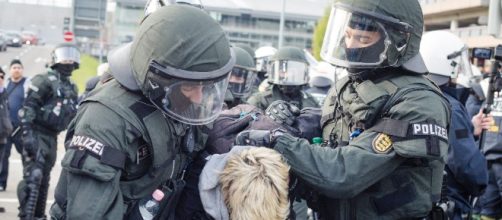Police and anti-fascist protestors have clashed on the streets of the German city of Hanover today, leaving some people injured. Protestors had set up a blockade outside the far-right Alternative For Germany party's first party conference since they gained a substantial presence in the German parliament in September's elections. Police used water cannons and batons to try to repel the demonstrators in an attempt to guarantee safe entry for the party's estimated 600 delegates. The party was convening to elect a new leader after a co-chair of the party resigned in September.
Nationalism is growing in Europe
Alternative for Germany, also known as Alternative for Deutschland (Afd) managed to win 12.5 percent of the vote during the German elections which were held in September. Angela Merkel's conservative Christian Democratic Union (CDU) party lost support to Afd during the election, and a weakened position has seen Angela Merkel turn to the centre-left Social Democrat party in the hope of forming a coalition government. These talks have since collapsed and the possibility of a new election has been touted as a future resolution to the precarious state of current German politics.
Nationalism on the rise in Europe
Nationalism has been on the march across Europe in the last couple of years.
Several European countries have seen sharp rises in support for nationalistic or far-right parties. In France, Marine Le Pen of the French National Front came second in the French elections earlier this year, managing to gain 33 percent of the vote. In the Netherlands Geert Wilders' far-right populist party The Party for Freedom (PVV) managed to gain 20 seats in Holland's House of Representatives in the 2017 Dutch elections, making them the second largest party in the Netherlands.
In Eastern Europe, centre right and far-right populist parties have been gaining a steady foothold in the realm of politics also, mainly due to their response to the migrant crisis which has affected Europe since 2015.
Hungary's Prime Minister Viktor Orban has received praise and criticism in equal measure when it comes to his refusal to accept the mandated quotas that the EU has demanded of its member states when it comes to the resettlement of refugees and migrants. Poland has also seen a groundswell in support for nationalism in recent years, last month a march was held by Polish nationalists, this march which was designed to coincide with Poland's Independence Day has been described as the biggest ever nationalist march Europe has ever seen. It is believed that up to 60,000 people attended the event. The anti-immigration attitudes that have been growing since the influx of refugees and migrants from the Middle East and Sub-Saharan Africa seem to be the common thread that links a lot of these parties and makes them similar ideological bedfellows.
Ten protestors taken into custody
During these clashes today, one demonstrator had his leg broken after he chained himself to a barricade, another officer had his hand cut when a bottle was thrown at him. Ten protestors have been taken into custody. There looks to be a larger gathering of pro-immigrant protestors gathering in Hanover tonight on what has been a freezing cold day in the city. Thankfully, thus far it appears that nobody has been seriously injured, but many fear that scenes like these are going to be more of a regular sight on the streets of European cities, as people from polar opposites of the political spectrum clash over their ideologies as the political climate grows more toxic by the day.


